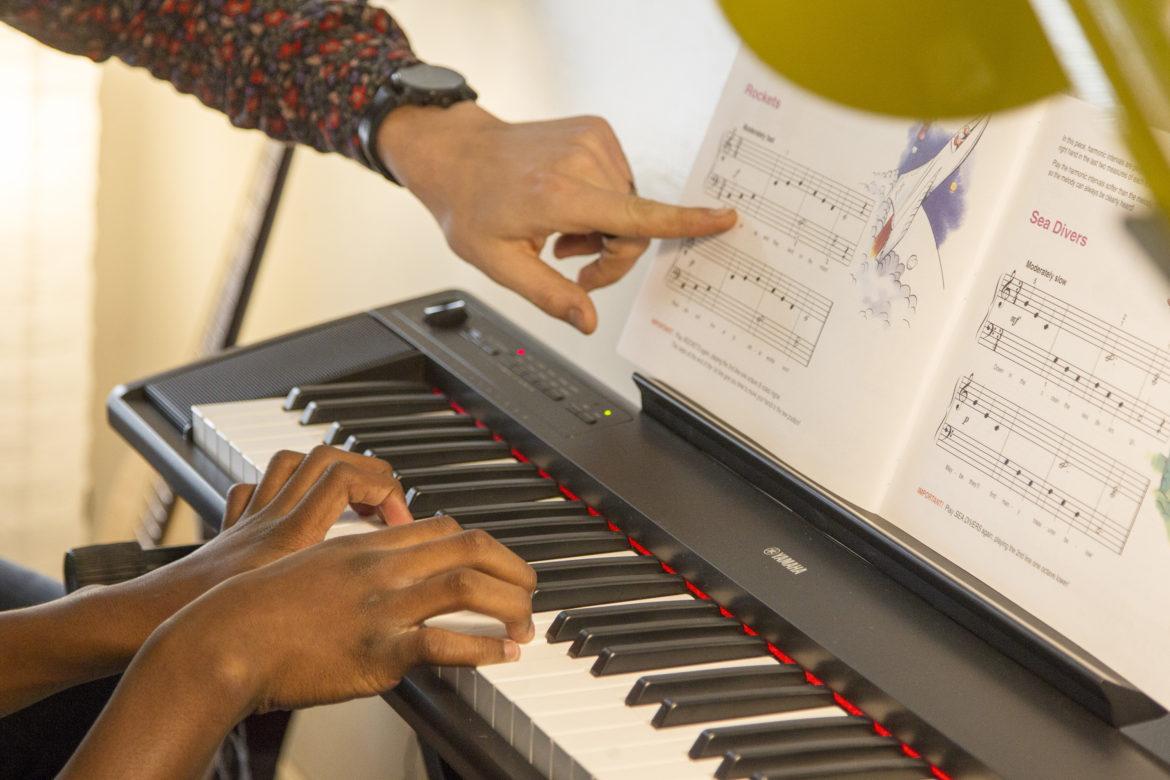The sweet melodies of the piano, the drumming of drums, tambourines and the strumming of the guitar are just some sounds that can be heard out of CSUN’s Music Therapy Wellness Clinic.
The clinic, established in 1996 by director and professor of music therapy Ronald Borczon, has been nothing but a success. What started with only Borczon and another music therapist in a classroom soon became something nobody expected. The clinic now has five board-certified music therapists and sees over 50 clients a week.
Music therapy is provided by a board-certified trained music therapist that addresses non-musical goals for socialization, communication, and physical and emotional skills with music, according to adjunct professor of music therapy, Helen Dolas.
“Music is known first and foremost to bring people together, so if you look at the socialization domain a lot of people who have mental illness like depression can become very isolated so when you come in as a music therapist and you do a group therapy, the music helps draw them out and they become from that isolation to being part of a group of people,” said Dolas.
Music therapy is proven effective and only recently has become more well-known, and in turn, has come to be a popular therapy option for many individuals.
“I think this is happening because more and more research is being done on music and the brain that we are understanding the capacity of music and the importance of it and how it affects us physically, physiologically, emotionally, psychologically, neurologically and emotionally,” said Dolas.
When asked about the motivation behind the establishment of the Music Therapy Wellness Clinic, Borczon says it was two things.
“It was two-fold. One was to bring music therapy services to the San Fernando Valley and its surrounding areas. Secondly, to serve as a forum to educate the music therapy students at CSUN,” said Borczon.
The Music Therapy Wellness Clinic helps provide music therapy services to families that want the services they can’t get anywhere else since there is no other place in the Valley where one can get the service the clinic offers. The clinic is a unique place for self-development and interaction with a trained therapist for music. Even if someone is a student who is having a hard time and just wants to learn how to express or work through things through music, the clinic is available for them.
CSUN’s Music Therapy Wellness Clinic is also one of the few universities in the country that has a clinic attached to the music therapy program, making their work even more reputable within the community and nationally. The clinic offers individual sessions and small group sessions, they have two choirs and they offer outreach programs into the community.
“We were just awarded a $55,000 grant from The Music Man Foundation so we are providing music therapy services this year to Northridge Hospital pediatric units and also to Lokrantz Special Education Center,” said Borczon.
For Borczon, the most important thing about working and being director of the Music Therapy Wellness Clinic is watching people do or say things that they would not do in any other type of therapy.
“We’ve had many what we call ‘mini miracles’ in the clinic, like children with autism who have never talked say their first words, people who have had strokes unable to speak sing songs fluently,” said Borczon. “It’s just a lot of goodness, that’s a good word.”
Yessenia Gonzalez, who recently became the new assistant director of the Music Therapy Wellness Clinic in July 2018 and who has been a music therapist at CSUN since December 2014, says that her experience at the clinic has been great because she gets to work with her clients as a therapist and is able to reach out to them and check in to see if they are happy as an assistant director.
Gonzalez also deals in making sure billing is sent out, therapists get paid and that the necessary equipment is available, paperwork, consent forms, and making sure that everything is in place at the clinic. On the other hand, for Gonzalez, music therapy is about helping other people while also helping herself.
“The smallest things really count with my clients and that’s amazing, and to be able to appreciate all those things that other people don’t have, it makes you appreciate what you do have,” said Gonzalez.
Music therapy major Suzanne Gutierrez wants to be a music therapist after learning about it while researching options on what she could return to school for and make it worthwhile and fruitful.
“I think the Music Therapy Wellness Clinic is an amazing thing. It offers so much for the community and with every session, it’s all pure music therapy and the fact that they have it here is amazing,” said Gutierrez.
Laurie Samaan has been bringing her daughter to the clinic for almost two years and says the experience has been a turning point.
“My daughter, she loves it and looks forward to her session every week and is always asking when she gets to come back,” said Samaan. “I just feel like they have been single-handedly responsible for helping her unlock her speech and developmentally it has been what we needed at a time we needed it.”
The clinic is open for anyone, and people who want to sign up can do so by going on the music department’s website and there will be a link to the clinic’s sign up form. Fees for individual or group sessions are also listed on the website.
Music therapy can be used for anything up to people just seeking wellness in their life. It is not just a rehabilitative setting, but also an avenue to stay healthy.
“We’ve touched thousands of lives through the clinic since it started and I think one of the greatest things about being alive is being of service to others and that’s what the clinic has done,” said Borczon.












